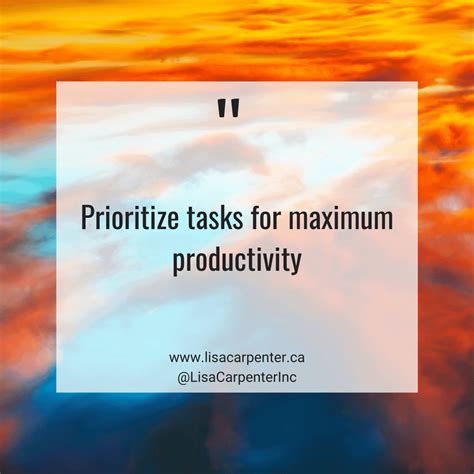In today's fast-paced world, where every minute counts, understanding the enigmatic science behind effective allocation of our most valuable resource – time – is crucial. A mastery of this art can lead to enhanced productivity, decreased stress levels, and a greater sense of accomplishment in both our personal and professional lives. By delving into the depths of time management strategies, we can discover the keys to unlocking our true potential and maximizing our daily output.
Picture a scenario where you effortlessly glide through your to-do list, effortlessly transitioning between tasks with a sense of purpose and precision. No longer will you feel overwhelmed by the mounting pile of responsibilities that lay ahead. Instead, armed with strategies and techniques honed through diligent practice and conscious awareness, you will find yourself deftly navigating the intricacies of time management like a skilled conductor orchestrating a symphony.
Embarking on this journey of self-improvement and efficiency requires a shift in mindset, as time management is not a mere set of rigid rules to blindly follow. It is an art that necessitates a deep understanding of individual strengths, weaknesses, and priorities. Developing this self-awareness is the first step towards unraveling the secrets behind effective time organization, allowing us to tailor strategies that align with our unique circumstances.
Prioritizing Your Tasks for Maximum Productivity

In the pursuit of optimal efficiency and accomplishing more in less time, it is essential to prioritize your tasks effectively. By identifying the most important and urgent tasks, you can strategically allocate your time and energy, ensuring that you make the most of every moment.
1. Determine your priorities
- Identify your overall goals and objectives
- Break them down into smaller, actionable tasks
- Consider the deadlines and consequences of not completing certain tasks
2. Evaluate task urgency
- Assess the time sensitivity of each task
- Consider the impact of delaying or not completing a task
- Take into account external dependencies and time constraints
3. Assess task importance
- Evaluate the significance of each task in relation to your goals
- Consider the potential long-term impact or benefits of completing a task
- Weigh the value of each task in terms of productivity and personal growth
4. Prioritize based on effort and resources
- Consider the amount of time, energy, and resources required for each task
- Balance the workload by prioritizing tasks that can be completed more efficiently
- Take into account any available assistance or support for certain tasks
5. Create a task list or schedule
- Compile a comprehensive list of all your tasks
- Organize them based on their priority level
- Allocate specific time slots or deadlines for each task
By following these steps and consistently reviewing and adjusting your task priorities, you can enhance your productivity and ensure that you are effectively utilizing your time. Remember, it's not always about doing more tasks, but rather focusing on the right tasks that contribute towards your goals and personal growth.
Optimizing Time Usage through Setting Realistic Goals
Efficient time management is an essential skill for individuals seeking to accomplish their tasks and achieve success in various aspects of life. One crucial factor in managing time effectively is setting realistic goals. Setting realistic goals allows individuals to prioritize their tasks, allocate time accordingly, and optimize their time usage. This section will explore the significance of setting realistic goals and provide practical strategies to help individuals maximize their productivity.
Understanding the Importance of Realistic Goals
Setting realistic goals is crucial as it helps individuals gain clarity and focus on what they want to achieve. By setting achievable targets, individuals can avoid overwhelming themselves with excessive workloads or unattainable objectives. Realistic goals provide a sense of direction, motivating individuals to stay organized, disciplined, and proactive in managing their time.
Aligning goals with one's capabilities and resources ensures better utilization of time and prevents individuals from feeling overwhelmed and discouraged.
Strategies for Setting Realistic Goals
1. Assessing Abilities and Constraints: Before setting goals, individuals should evaluate their abilities, skills, and available resources. It is important to consider personal strengths, weaknesses, and external factors that may impact goal attainment. This evaluation helps in setting goals that are both challenging and attainable.
2. Breaking Down Goals into Smaller Tasks: Breaking down larger goals into smaller, manageable tasks allows individuals to focus on specific actions and monitor progress more effectively. This approach not only makes the overall goal less intimidating but also helps in tracking accomplishments along the way.
3. Prioritizing Goals: Identifying the most important goals helps individuals allocate their time, energy, and resources more efficiently. Prioritization ensures that the essential tasks receive adequate attention, while less critical tasks are addressed accordingly without compromising overall productivity.
4. Setting Time-Bound Milestones: Establishing realistic deadlines for different milestones along the way helps individuals maintain progress and overcome procrastination. Time-bound milestones create a sense of urgency and accountability, enabling individuals to stay on track and meet their goals within the desired timeframe.
5. Reassessing and Adjusting Goals: As circumstances change, it is important to reassess goals regularly and adjust them accordingly. Flexibility in goal setting allows individuals to adapt to new challenges, opportunities, and personal growth, ensuring continued optimization of time usage.
By setting realistic goals, individuals can effectively optimize their time usage, minimize stress, and enhance productivity. The strategies mentioned above provide a framework for setting achievable objectives and navigating the path towards successful time management.
Eliminating Time-Wasting Activities and Distractions

In this section, we will explore effective strategies to optimize our use of time by eliminating unnecessary activities and distractions. By identifying and prioritizing our tasks, we can enhance productivity and achieve better work-life balance.
The key to unlocking our true potential lies in recognizing the various activities and distractions that consume our valuable time. Identifying time-wasters such as excessive social media usage, frequent interruptions, inefficient multitasking, and unnecessary meetings can help us regain control over our schedules.
- Minimizing Social Media Usage: We can reduce time spent on social media platforms by setting specific time limits or using browser extensions that limit access during working hours.
- Managing Interruptions: By creating designated work periods and communicating our availability to colleagues and friends, we can minimize interruptions and maintain focus on important tasks.
- Practicing Effective Multitasking: Instead of trying to handle multiple tasks simultaneously, we can improve efficiency by prioritizing tasks, dedicating focused time to each, and avoiding constantly switching between them.
- Evaluating Meeting Necessity: Assessing the purpose and relevance of meetings before attending can help minimize unnecessary time commitments. It is important to ensure that meetings have clear agendas and defined outcomes.
By implementing these strategies and actively eliminating time-wasting activities and distractions, we can maximize our productivity, make the most of our time, and achieve our goals more effectively.
Harnessing the Power of Time Blocking for Enhanced Efficiency
Maximizing productivity and achieving optimal efficiency in today's fast-paced world can often feel like an elusive goal. However, there is a potent technique that can help you regain control and streamline your daily activities: time blocking. Time blocking is a strategic method that involves allocating specific blocks of time to different tasks, priorities, or areas of focus. By adopting this approach, individuals can effectively manage their time, improve their focus and concentration, and ultimately enhance their overall efficiency and productivity.
One of the key advantages of time blocking is its ability to provide structure and organization to your schedule. By visually blocking out designated time slots for various activities, you can establish a clear plan for each day, week, or month. This not only helps you avoid overcommitting or rushing through tasks but also ensures that you allocate sufficient time to important activities that may otherwise be neglected or easily forgotten.
Moreover, time blocking encourages discipline and self-accountability. By setting specific time frames for tasks, you create a sense of urgency and avoid succumbing to procrastination or distractions. It allows you to prioritize activities based on their importance and allocate your energy and resources accordingly. This method also enables you to identify and eliminate time-wasting activities, thereby increasing your productivity and efficiency.
| Benefits of Time Blocking: |
|---|
| 1. Increased productivity and focus |
| 2. Improved time management skills |
| 3. Enhanced prioritization of tasks |
| 4. Minimized procrastination and distractions |
| 5. Better work-life balance |
| 6. Reduced stress and overwhelm |
Additionally, time blocking fosters a sense of accomplishment and satisfaction. As you complete each block of time dedicated to a specific task or goal, you experience a sense of progress and achievement. This not only boosts your motivation but also reinforces your commitment to future time blocks.
In conclusion, time blocking is a powerful technique that can significantly enhance your efficiency and productivity. By harnessing the benefits of structured scheduling and strategic allocation of time, individuals can effectively manage their tasks, improve focus, and attain optimal results in both personal and professional endeavors.
Empowering Your Productivity with Technology Tools

In the modern era, harnessing the capabilities of technological tools is indispensable for optimizing efficiency and organization. This section explores the potential benefits and practical applications of leveraging technology for streamlined time management, ensuring that your valuable resources are utilized effectively.
Enhanced Task Tracking: Thanks to innovative software and applications, managing and tracking tasks has become more effortless than ever before. These digital tools allow you to create to-do lists, set reminders, and allocate tasks with ease, helping you stay on top of your priorities and deadlines.
Collaborative Calendars: Collaborative platforms and shared calendars foster seamless coordination and communication among team members, ensuring that everyone is on the same page and aware of important events, meetings, and deadlines. By efficiently managing schedules and coordinating efforts, you can enhance productivity and avoid unnecessary conflicts or delays.
Automated Time Tracking: Technology tools also provide automated time tracking solutions, allowing you to gain comprehensive insights into how you spend your time. By analyzing patterns and identifying areas of improvement, you can optimize your workflow, eliminate time-wasting activities, and allocate resources more efficiently.
Efficient Communication: Effective time management heavily relies on efficient communication. Technology tools enable instant messaging, video conferencing, and project management systems, eliminating the need for lengthy email threads or face-to-face meetings. By streamlining communication processes, you can reduce time spent on unnecessary discussions and enhance collaboration and productivity.
Smart Notifications and Alerts: Utilizing smart notifications and alerts ensures that you are well-informed and never miss important deadlines or tasks. These tools send reminders and notifications via various applications and devices, such as smartphones and smartwatches, allowing you to stay organized and focused, even when you're on the go.
By effectively utilizing the wide range of technology tools available, you can unlock a world of possibilities for streamlining your time management practices. Adopting these tools will empower you to work smarter, not harder, and achieve your goals with enhanced efficiency and effectiveness.
Developing Productive Time Planning and Establishing Efficient Routines
Mastering the art of managing your time effectively is a fundamental skill in today's fast-paced world. By cultivating productive time management habits and establishing efficient routines, you can maximize your productivity, minimize stress, and achieve your goals with ease.
1. Prioritize Your Tasks: Start by identifying and categorizing your tasks based on urgency and importance. This enables you to focus on the most critical tasks and allocate your time accordingly.
2. Set Clear Goals: Clearly define your short-term and long-term goals to provide yourself with clear direction. Having well-defined objectives helps you make better decisions and stay motivated throughout the process.
3. Plan and Schedule: Create a structured plan that outlines your daily, weekly, and monthly tasks. Use calendars, to-do lists, or digital tools to schedule and allocate specific time slots for each task or activity.
4. Eliminate Time Wasters: Identify and eliminate activities that consume your time without adding value to your goals. This includes excessive social media usage, unnecessary meetings, and other distractions that hinder your progress.
5. Take Breaks and Rest: While it may seem counterintuitive, taking regular breaks and allowing yourself time for rest is crucial for maintaining high levels of productivity. Incorporate short breaks into your schedule to recharge and prevent burnout.
6. Establish Daily Routines: Develop consistent daily routines that align with your goals and priorities. By implementing specific habits and rituals, you can streamline your workflow and create a structured routine that maximizes your efficiency.
7. Practice Time Blocking: Time blocking involves grouping similar tasks together and allocating dedicated time blocks for each category. This technique enhances focus, minimizes context switching, and improves overall productivity.
8. Delegate and Outsource: Recognize that you don't have to do everything on your own. Learn to delegate tasks that can be handled by others and outsource certain responsibilities, allowing you to focus on more critical activities.
9. Adopt Technology Tools: Explore and utilize time management apps, software, or digital tools that can help you streamline your tasks, track your progress, and optimize your time usage.
10. Reflect and Adjust: Regularly evaluate your time management strategies and routines. Reflect on what works well and what needs improvement, and make necessary adjustments to enhance your effectiveness over time.
By implementing these effective time management habits and establishing productive routines, you can unlock your potential, accomplish more in less time, and create a balanced approach to work and personal life.
Striking a Balance: Time Management Strategies for Work and Personal Life

In this section, we explore effective approaches to find equilibrium between professional commitments and personal pursuits. Discover practical techniques to achieve a harmonious blend of work and personal life while optimizing time management.
FAQ
How can I effectively manage my time?
Effective time management can be achieved by setting clear goals, prioritizing tasks, and creating a schedule. It is also important to eliminate distractions and delegate tasks whenever possible. Additionally, practicing self-discipline and learning to say no to non-essential commitments can greatly improve time management.
What are some common time management mistakes that people make?
Some common time management mistakes include poor planning, giving in to distractions, not setting clear goals, and procrastination. Other mistakes can include not delegating tasks, overloading oneself with too many commitments, and failing to establish boundaries with others.
How can I balance my personal and professional life through time management?
Achieving work-life balance through effective time management requires setting boundaries, prioritizing tasks, and allocating specific time for both personal and professional activities. It may involve seeking support from others, learning to say no to excessive work demands, and making time for activities that promote relaxation and stress reduction.
What strategies can I use to overcome lack of motivation when managing my time?
To overcome a lack of motivation when managing time, it can be helpful to break tasks into smaller, more manageable chunks. Setting rewards or incentives for completing tasks can also provide motivation. Additionally, finding ways to make tasks more enjoyable or meaningful, such as connecting them to long-term goals, can increase motivation.
How can technology assist with effective time management?
Technology can be a useful tool for effective time management. There are various apps and software available that can help with task organization, reminders, and tracking progress. Virtual calendars and scheduling tools can also assist in managing appointments and deadlines. However, it is important to use technology judiciously and avoid getting overwhelmed or distracted by it.



